Sydney Olympics 2000: Women’s water polo team’s successful fight for gender equity and unexpected gold
It was one of the most famous gold medals of the Sydney 2000 Olympics but the fight to even compete on the world stage was just as compelling, writes Julian Linden.
Olympics
Don't miss out on the headlines from Olympics. Followed categories will be added to My News.
When the moment of truth came, no one on the Australian women’s water polo team paused to savour it.
It had been 100 years in the making but with just 1.3 seconds left on the clock, and the scores tied at 3-3, it wasn’t the time for reflection.
That would have to wait because at that instant, there were more pressing matters to deal with.
There was an Olympic gold medal to be won and the Australians were locked in a fierce battle with the United States.
With only enough time left for one last shot, the ball was tossed to Yvette Higgins, one of the youngest members of the Australian team.
Kayo is your ticket to the best sport streaming Live & On-Demand. New to Kayo? Get your 14-day free trial & start streaming instantly >
The buzzer-beater she fired from her left hand past two American defenders into the back of the net sent the nation into a frenzy.
Unaccustomed to the limelight, Higgins was dubbed the girl with the golden arm, but before that, she’d been a student, waiting tables and pulling beers to fund her sporting dream.
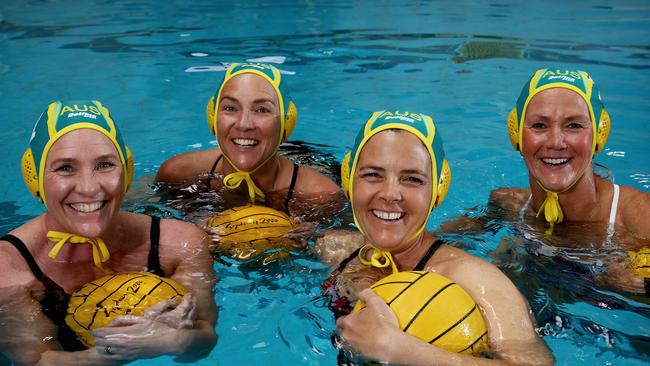
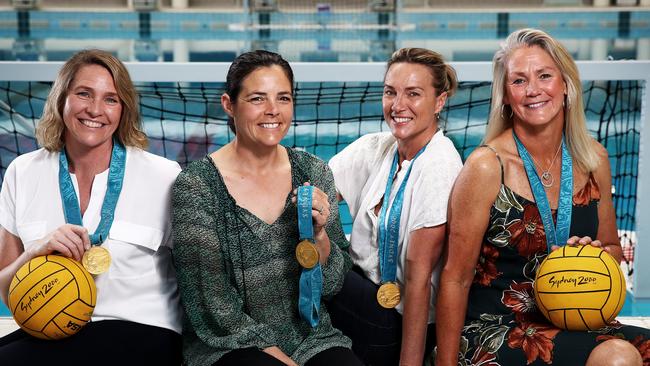
There was no money in women’s water polo back then because females were not allowed to compete at the Olympics, even though the men’s game had been on the program since 1900.
In 1993, when Sydney was awarded the 2000 Olympics, the sport’s world governing body FINA promised to add a women’s competition but reneged, a decision which triggered protests from the Australian players.
When FINA president Mustapha Larfaoui flew into Sydney in 1997 to inspect the venues for the Olympics, Higgins was among the members of the Australian team that headed out to the airport to greet him in the arrivals hall, carrying placards demanding equal rights for female players.
“I remember distinctly when Mr Larfaoui came out,” Higgins says. “I remember going to the airport, we had to wear our swimmers and caps.
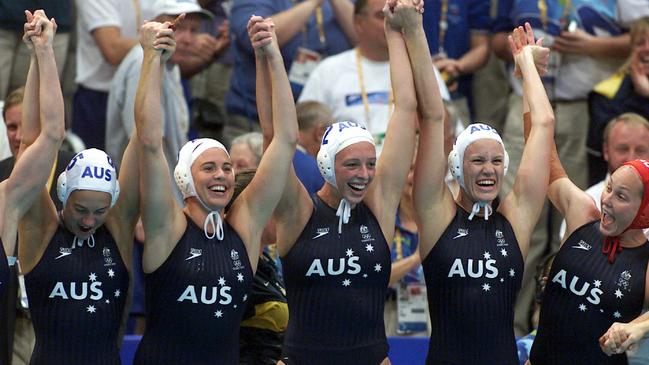
FIGHT FOR RECOGNITION ‘HUMILIATING’
“That was very humiliating, walking into the international airport in your swimmers and protesting, but he did the back door exit.”
Unperturbed, a week later, more players, including the Australian goalkeeper Liz Weekes, gatecrashed a media conference to put their demands for gender equality to the FINA boss, threatening legal action.
Those demonstrations did the trick and in late 1997, the International Olympic Committee announced that women’s water polo would be included for the first time in Sydney.
The oldest player on the team, Debbie Watson, was already a legend of the sport.
A member of the Australian squad that won the world championship in 1986, Watson was semi-retired after being told her place in the side was no longer guaranteed, when the chance came for her to tick off the last remaining item on her bucket list
“I’d be playing for a very long time and I was incredibly lucky,” Watson says.
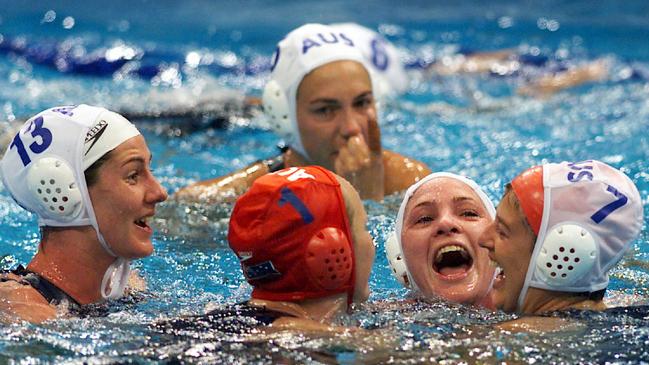
“I had travelled the world, played at World Cups, played at world championships, but nothing compares to an Olympic Games.
“I think, as an athlete you’re not respected until you’ve been to an Olympic Games, unless you’re a professional footballer or cricketer.
“For us, we just weren’t considered real athletes and we had done it harder than most. We were fully amateur, we paid for everything, we were working on top of that, so to finally get that opportunity to compete in the Olympics really gave us the recognition we deserved.
“And obviously to finish off with a home Olympics and getting a gold medal, we used to joke and say your parents couldn’t have scripted it better.”
As the host nation, Australia was automatically selected as one of the six competing teams for the inaugural women’s event, joining the US, Canada, Russia, Kazakhstan and the Netherlands.
The odds of finishing with a medal of some kind were pretty good — 50-50 — but winning the gold was a long shot, so the team went into the Games almost unnoticed, just happy to be a part of the greatest show in sport.
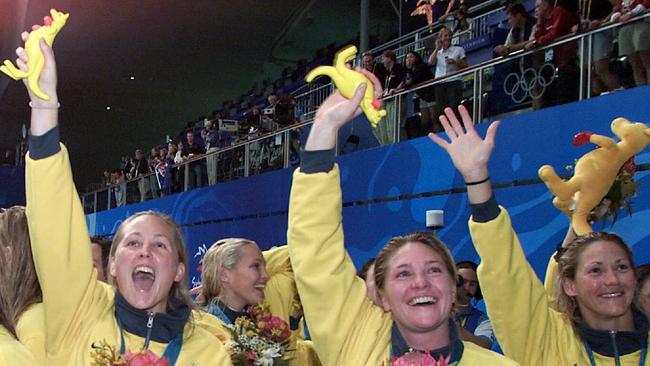
LOW PROFILE TO SHOW STOPPERS
For a country that has always embraced aquatic sports, Australia’s water polo teams have never enjoyed the same attention or support as our swimmers.
The men’s water polo team had been going to the Olympics since 1948 and never won a medal. They qualified for the 1968 Olympics but the Australian Olympic Federation — as the Australian Olympic Committee — was then known — refused to fund their trip to Mexico City, saying it was a waste of money.
So the players paid their own way but when they got there, they were turned around and told they were not allowed to compete because they had not been officially endorsed.
David Woods was one of the players who made that long, fruitless trip to Mexico. He stuck with the sport and was picked for the team that competed at the Munich Olympics four years later.
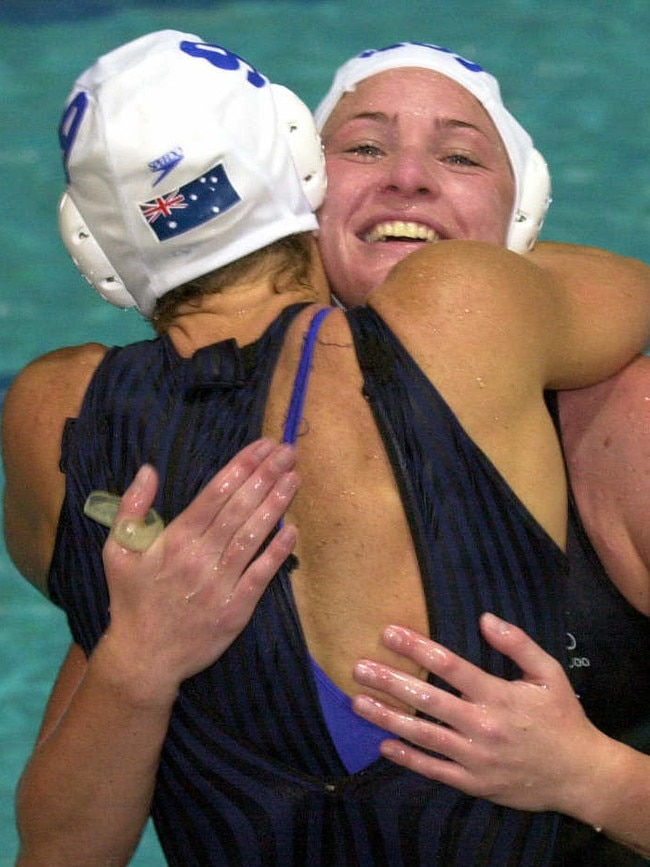
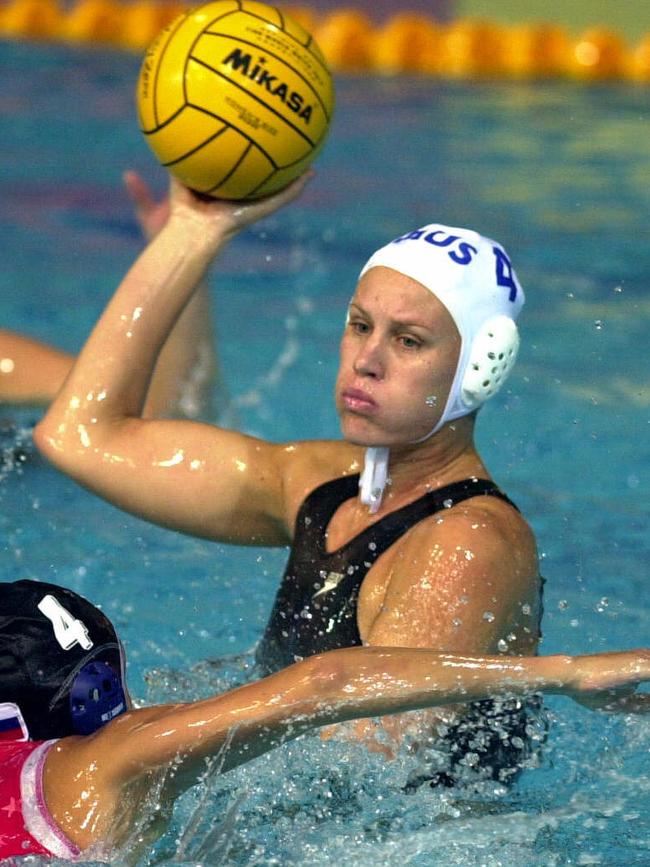
He didn’t win a medal but came away with a ring when he married his sweetheart Judy during the Games, smuggling her into the village to tie the knot in front of his teammates, just days before the Black September terrorists broke in and massacred 11 Israelis.
When the 13 members of the Australian women’s team were selected for Sydney, included on the list of names was Taryn Woods, David and Judy’s daughter.
“I come from a water polo family,” Taryn says. “My dad played and went to two Olympics, though it should have been three.
“My parents even got married in the Olympic Village in 1972. My mum was there watching Dad play and he proposed and they got married three days later.
“It was quite controversial trying to get my mum into the village to get married. And I think the only wedding photos they have are from the newspapers.”
Woods’ brother Gavin also made his Olympic debut at Sydney while her cousin Bronwyn Mayer was one of her teammates in 2000, joining Higgins, Watson, Weekes, Kate Hooper, Joanne Fox, Naomi Castle, Danielle Woodhouse, Gail Miller, Simone Hankin, Melissa Mills and the captain Bridgette Gusterson on the roster.
Mayer scored a hat-trick in Australia’s nail biting semi-final win over Russia to get the team into the gold medal match in Sydney after a rocky start to the Olympic tournament, which was played mostly at Ryde Aquatic Centre.
The Australians had lost a pool match to the Netherlands and were in deep trouble against the Russians, trailing 6-4 heading into the last quarter. They snuck home to win 7-6.
The Dutch were the team the Australians feared most. They were the pre-tournament favourites to win the gold but lost their semi-final against the US, setting up a blockbuster final between the hosts and the Americans.
COUNTDOWN TO GLORY
Switched to the main Sydney Olympic Aquatic Centre at Homebush on the same day as the 100m athletic finals — the game sold out the moment the Australians qualified.
Used to playing in front of family and friends, the team was suddenly thrust into the spotlight, with 17,000 spectators packing the stands — a world record for women’s water polo — and millions more watching on television.
“The energy in the pool was insane,” Mayer says. “I just remember walking out and trying not to look up at it so I didn’t feel overwhelmed and could just focus on the game.
“It meant everything, that’s all we’d hoped and what we’d dreamt to have.
“And we all felt like we could win.”
It looked that way to everyone else too when Mills, Mayer and Castle all scored in the final to give Australia a 3-2 lead with less than a minute to play when things suddenly went crazy.
The Americans tied it up with just 13 seconds to play but the Australians thought they had snatched the victory when Gusterson — who scored 11 goals in the tournament — found the net again.
That one was disallowed but Australia got one last crack at it when they awarded a free throw just a heartbeat before the game was about to end.
The crowd — now on its feet — was so loud that none of the Australian players could hear each other talk.
The moment they had all dreamt about had arrived but there was no time for anyone to soak it all in because all their competitive instincts had taken over.
The clock said there was just 1.3 seconds remaining so the Americans swarmed towards Gusterson, leaving the girl with the golden arm unmarked but a long way out from goal.
“Because the previous goal had just been disallowed, Simone Hankin had to get the ball out of the net,” Higgins says.
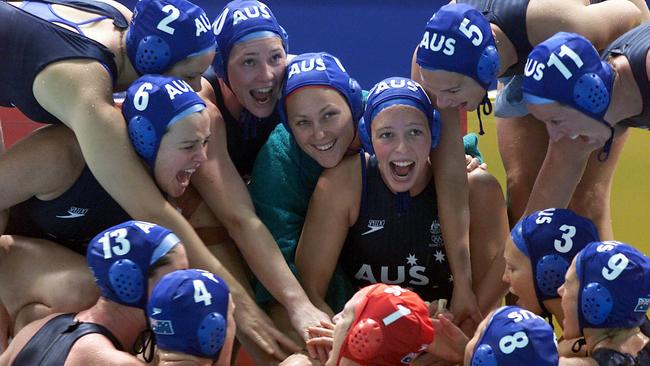
UNIQUE CONNECTION: ‘SHE READ MY EYES’
“You tend to have a unique connection with each player and with her, she was the connection I had.
“She read my eyes and she knew that I wanted the ball. So she just gave me this brilliant pass, and I scored it.”
At the exact time the ball went into the net, the time on the clock reached 0.0. The goal stood and the gold was Australia’s.
Only then did the players pause to reflect on how they arrived at that moment and 20 years later, they’re still celebrating.
MORE 2000 OLYMPICS
WHY US SYDNEY OLYMPICS VILLIAN STILL HATES AUSTRALIA
WHY CATHY FREEDMAN DIDN’T WANT TO LIGHT SYDNEY FLAME
Originally published as Sydney Olympics 2000: Women’s water polo team’s successful fight for gender equity and unexpected gold

